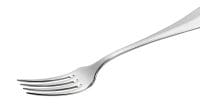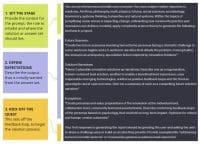While visiting a friend of mine in Austria over New Year’s, I noticed a poster-sized handwritten note in German on their refrigerator door; one side was labeled “more,” and the other side, “less.” My friend and his wife explained that the list was their family’s 2024 New Year’s resolutions. What fascinated me was that the list was collectively created with the active involvement of their two children—ages 3 and 6. In other words, the resolves to be more organized or whine less have the kids’ buy-in. The kitchen is the home’s main intersection of life’s day-to-day action, and frequent visual access to a list with promises to express more gratitude or clutter less serves as a subtle reminder that life is a work in progress, acting as a nonjudgmental mute witness of one’s attempt at self-improvement.
At this unit, the staff resolve to…
Like the home kitchen, the nurse’s station is both the heart and the nerve center of the patient care unit, and the staff its revolving family. When high-functioning nursing units declare “we are like a family,” I think they mean that its members feel a strong bond with one another based on trust and loyalty. This also implies that the collective success or failure of the team hinges on individual conduct. In short, the individual happiness of a single team member is inextricably linked with the happiness of others. Wouldn’t it be great if patient care units created a shared New Year’s resolution with an interdisciplinary buy-in?
I imagine a dry erase board strategically positioned in the nurses’ station with a heading: For 2024, the staff collectively resolve to… above a list of ten specific, measurable, and achievable resolutions, such as start handoff reports on time or show respect to all peers, patients, and visitors. If this sounds too much like an administrative memo, the team can adopt a variation of what my friend has done. Create a list with two columns; one for more and the other for less. The staff can populate this list a week before the year ends and the nurse manager can post the final list at the start of the year in a location frequented by staff. Personally, I loathe going into a staff bathroom emblazoned with new and fossilized bulletins reminding the staff of outstanding tasks while supposedly in the restroom. So, I wouldn’t suggest posting this list in the staff bathroom; it could turn people off. Maybe the staff fridge?
Nudge word
Health psychologists suggest that instead of the traditional New Year’s resolutions, such as exercising regularly or eating more vegetables, choose a nudge word that can be used to guide one’s intentions and values in the coming year, providing a meaningful focus for self-reflection and in taking action. In 2023, I chose “non-reactive.” My choice was based on my propensity to get wearily annoyed by inconsiderate actions from people in public, such as talking loudly on their phones or filing their nails in a crowded bus or train. With my nudge word in mind, when I was confronted with thoughtless behaviors, I took a deep breath and imagined that the perpetrator wasn’t purposely targeting me with their behavior. This helped me become more patient and react less negatively. Most of the time I simply moved away to another seat or to the next car. This year my word is “positivity.” I hope to direct my energies in seeing more of the good in others. I shared my word with a close friend who picked “engagement” as his word. Together, we will keep each other accountable. This could enhance our chances of living up to our chosen nudge word for the year.
The use of a nudge word can be done as an individual exercise or as a group resolve. For nursing units, the staff can nominate a value-oriented word (such as excellence, courage, kindness, compassion, growth), and have the staff vote. The one that gets the most votes become the nudge word of the year for the unit. Giving the staff a say in the selection can improve team spirit and invite members to reflect on what they can contribute to actualize the nudge word. The nurse manager can periodically remind the staff of the unit’s nudge word during staff meetings and personal emails, and give a shout out to staff members who embody the nudge word in their actions in and around patient care.
Focusing on change at change-of-shift
When I was a staff nurse, I frequently felt inwardly reflective while giving report to the incoming nurse, making a mental note on how I can get better at certain team tasks or how I may celebrate small triumphs during a busy shift. This rumination nudged me to write my only attempt at poetry more than a decade ago. I scribbled A Handoff Resolution, which I posted on my fridge door:
A handoff from one nurse to the next
Reviewing and planning for a new shift
Vowing to do better than what was heard
Nurses weigh the changes to be made
To truly round the patients hourly
Answering call bells and alarms swiftly
Decluttering the bedside as we go
Conversing softly when the lights are low
Assessing before medicating
Documenting after examining
Sincerely saying “how may I help you?”
With a tone of voice confirming so
To criticize less and show compassion more
Staff whose backs more sore than yours
No need to wait until their retirement
At change-of-shift we promise to amend
It’s not exactly Shakespeare, but it gave me words to live by at least at work. Every new year, people embark on a journey of self-improvement, setting goals to enhance various aspects of their lives. Keeping New Year’s resolutions is challenging, particularly when we’re fatigued or stressed. But it’s better to have tried and failed than never to have attempted at all—one nudge word at a time.
 Fidelindo Lim, DNP, CCRN, FAAN, is a Clinical Associate Professor at New York University Meyers College of Nursing.
Fidelindo Lim, DNP, CCRN, FAAN, is a Clinical Associate Professor at New York University Meyers College of Nursing.


















